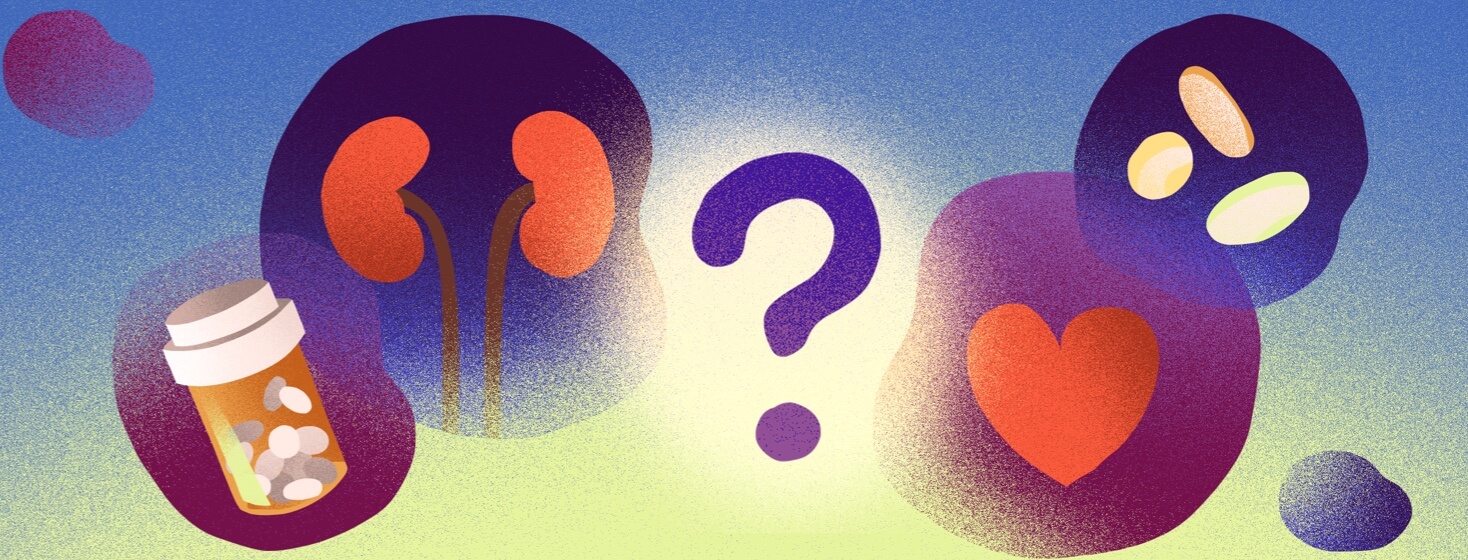What Is Nephrotic Syndrome?
Nephrotic syndrome is a set of symptoms that signal the kidneys are not working adequately. It is also sometimes called leaky kidney.1
In adults, nephrotic syndrome is commonly caused by rare kidney diseases. But it can happen for a variety of reasons.1
Who can get nephrotic syndrome?
Anyone can get nephrotic syndrome. It affects both children and adults.1
What are the symptoms of nephrotic syndrome?
Symptoms of this nephrotic syndrome include:2,3
- Urine that looks foamy
- Swelling, especially around eyes, ankles, and feet
- Fluid retention that leads to weight gain
- Feeling tired frequently
- Feeling less hungry than normal, or not at all
- High levels of fats in the blood
- Low levels of protein in the blood
- Pain in the belly (anywhere from the ribs to the pelvis)
- Feeling unwell or sick
Some people may also lose vitamin D and calcium. This can lead to bone loss, weak hair, and brittle nails.3
What causes of nephrotic syndrome?
Your kidneys contain groups of tiny vessels called glomeruli. Glomeruli filter the blood and separate it. This lets the body keep what it needs and get rid of what it does not.2
Healthy glomeruli keep blood protein from entering the urine. Having the right amount of blood protein keeps your body from holding onto too much fluid. Damaged glomeruli allow protein to leak into the urine.2
Protein in the urine is what makes it look foamy. Too little protein in the blood is what drives fluid retention. When too much blood protein exits the body, it is called nephrotic syndrome.3
Nephrotic syndrome can occur alongside many kidney diseases. It can also occur with diseases that affect other parts of the body, such as:2,4
- Lupus
- Diabetes
- Amyloidosis
- Focal segmental glomerulosclerosis
- Minimal change disease
- Membranous nephropathy
How is nephrotic syndrome diagnosed?
Your doctor may order a urine and a blood test. The urine test will check for protein and blood in the urine. The blood test will check for how well your kidneys are working. A kidney biopsy may also be needed.3,4
Your doctor may also evaluate if other diseases are present.3,4
What are the complications of nephrotic syndrome?
Possible complications of nephrotic syndrome include:2,5
- Poor nutrition
- Infections, including blood infections
- Kidney injury
- Chronic kidney disease
- Low calcium levels
- Bone abnormalities
- High levels of lipids (fats) in the blood
- Blood clots
- Loss of bodily fluids
- High blood pressure
- Trouble breathing
- Fluid retention in the belly area
- Swelling or inflammation in the lining of the belly
What are the treatments for nephrotic syndrome?
Nephrotic syndrome is not curable. But it can be treated and managed. Treatment will help relieve symptoms and prevent damage to the kidneys.3
Your doctor may prescribe medicines and dietary changes. Medicines for nephrotic syndrome include:3
- Angiotensin-converting enzyme (ACE) inhibitors
- Angiotensin receptor blockers (ARBs)
These medicines help reduce pressure inside the glomeruli. This lessens the amount of protein that leaks into the urine.3
Your doctor may also prescribe water pills (diuretics). These aid the kidneys in removing fluid from the blood.3
Beta-blockers and calcium channel blockers are other options. These help to lower blood pressure. High blood pressure is a risk factor for heart disease and stroke.3
If you have nephrotic syndrome and develop a blood clot, you may be given blood thinners. These are also called anticoagulants. They help prevent blood clots from forming.3
If you have signs or symptoms of nephrotic syndrome, talk to your doctor. They can help you get the right diagnosis and treatment.
This or That
Are you satisfied with your current CKD treatment plan?

Join the conversation